Iran has no reason to trust United States: Former UN weapons inspector
A former UN weapons inspector says Iran has no reason to trust the United States after it quit the landmark 2015 nuclear agreement.
“Iran has no reason to trust the United States,” former UN weapons inspector Scott Ritter told Press TV’s Spotlight on Thursday, commenting on Iran’s demand for guarantee from Washington that it will not leave the deal again.
The JCPOA was inked by Iran and six world powers in 2015. Under the deal, Tehran agreed to put limits on certain aspects of its nuclear activities in exchange for the removal of international sanctions imposed against the country.
In 2018, however, the US exited the nuclear pact and began to unilaterally implement what it called a maximum pressure campaign against the Islamic Republic, effectively depriving Iran of the deal’s benefits by forcing third parties to stop doing business with Iran.
Iran remained patient for an entire year, after which it began to take incremental steps away from its nuclear obligations due to the other parties’ proven failure to secure its contractual interests.
The Islamic Republic’s nuclear steps prompted other signatories to enter talks earlier this year.
Iran has repeatedly said that it seeks the removal of all sanctions in a verifiable manner as well as a guarantee from Washington that it will not leave the deal again.
Here is a transcription of the latest episode of the Spotlight.
Host (Behrouz Nadjafi): Representatives from Iran and remaining parties to the 2015 nuclear agreement have resumed negotiations in Vienna. At the core of the talks are two draft proposals presented by Tehran on the removal of sanctions and its nuclear commitments. Iran's top negotiator stresses that this country will continue to engage in the talks seriously.
Ali Bagheri-Kani has asserted Tehran's determination to reach a good deal that will secure the rights and interests of the Iranian nation.
Meantime, the European Union's coordinator says that he feels a renewed sense of purpose among the delegations to reach an agreement. Tehran says we'll go back to full compliance with the deal as soon as the US sanctions are lifted effectively and verifiably.
Welcome to Spotlight, Iranian host Behrouz Nadjafi.
Let’s start this program by an update from our Vienna correspondent Homa Lezgee. Homa, over to you, what’s the latest?
Homa: Yes, as you said today we had a joint session here in Vienna. The decision is being made with the expert working groups to continue their sessions and resume their talks. So tomorrow Friday, the joint working group will be focusing on Iran’s nuclear commitments with human’s work at the same time and negotiations continue between different parties on a bilateral or trilateral level when it comes to sanctions removal.
I'll just quickly point to some of the issues that were raised today.
Mr Morra, the EU coordinator pointing out that he believes that is a difficult process and that there is a sense of urgency. And as time passes, this sense of urgency becomes more acute. Again, stressing that time is not unlimited, and the sides have to move quickly towards this will or intention for the JCPOA to be revived. He said that he believes as you said there, the sides have come back to the Vienna for serious work and when we talked earlier with the Iranian lead negotiator Mr. Ali Baqer-Kani, he also confirmed that Iran is serious in these talks, and it's basing its positions here on the proposals that it's made.
So Mr. Bagheri said that Iran recognizes the draft that's been worked on in the previous rounds, but it has its own proposals that have been presented to the other side in written form. And it's basing the continuation of negotiations on still its proposals.
At the same time, he said that he believes - from his view from this first day of talks here resuming- he believes, he said, that the Western side, the other side, has come with a more serious will for effective and result-oriented talks.
Nadjafi: Thanks for that. Homa Lezgee, Press TV correspondent at the venue of Vienna talks.
Okay, let me invite former UN weapons inspector and author of the book “Deal Breakers, Donald Trump and the Unmaking of the Iran Nuclear Deal”, Scott Ritter. He's joining us out of the Bethlehem in New York. Also, we will be joined by journalist and political commentator Mostafa Khoshcheshm from Tehran later on.
Scott, good to have you with us. So Iran’s delegation is saying that its intent on achieving results and reaching an agreement and that as soon as possible. Do you see the same level of seriousness on the other side, especially on the US and European sides?
Scott: I do. I mean, there's definitely seriousness on both the part of the United States and Europe to reach an agreement, whether or not their version of an agreement matches or coincides with Iran’s version. The agreement is yet to be seen. But, there is seriousness. There can be no doubt that the Biden administration understands what is at stake here?.
I think just this week, we had an Israeli delegation, built around the head of the Mossad, visit the United States and make a case for the need for military action against Iran if that agreement cannot be reached.
At the same time, the Israelis appear to be telling the Biden ministration that Trump’s withdrawal from the JCPOA was a disaster. That, you know, the notion that they could contain Iran through sanctions and compel Iran to return to the negotiating table to accept a lesser deal has been proven false and in what has occurred now is that Iran has actually expanded its nuclear capability in terms of enrichment. And if you are thinking the way the Israelis think that any Iranian enrichment program is automatically a weapons program simply because you now have the capacity to enrich uranium. We have to be concerned that Iran’s nuclear weapons program, even though that one doesn't exist, the potential for a weapons program, far more advanced today than it was when the JCPOA is in place. And Biden understands this. So I do believe the United States needs to find a path towards an agreement with Iran.
The problem is the United States has domestic political issues. It doesn't matter if the Biden administration believes there should be a deal that the United States Congress doesn't. The United States Congress believes that Iran must be stood up to. It believes that sanctions can work. There is a domestic consideration here, especially with elections coming in. So the Biden ministration is under a lot of pressure to come up with an agreement that one will be acceptable to Iran, but two will be palatable to a domestic political audience.
Nadjafi: Journalist and political commentator Mostafa Khoshcheshm is also joining us from Tehran. Good to have you, Mostafa. As you know, the US left the deal so Iran has no trust that this will not repeat again, and the US has also failed to dissuade its allies and failed also to fulfill its side of the bargain, Is this not enough reason to make Iran pessimistic about the intentions of the other sides of the deal?
Mostafa, do you hear me? It looks like we have problem with Mr. Khoshcheshm for now. Scott, did you hear my question?
Scott: I did, Iran has no reason to trust the United States. I mean, let's be frank. Iran never trusted the United States. Study the discussions that took place in the Iranian parliament prior to the July 2015 agreement come into effect, and you'll see that the Parliament, the government, the Supreme Leader, nobody trusts the United States, but there was an understanding that sanctions needed to be lifted and that they would accept this agreement with the full knowledge that at some point in time the United States would fail to live up to its commitments, and it only took three years before Donald Trump pulled out. So Iran has never trusted the United States and will never trust the United States. But Iran does need this agreement, does need sanctions lifted. And so, Iran is going into, I believe, this agreement with their eyes wide open understanding that the United States cannot be seen as a trusted partner. But the hope is that the other signatories, the other parties to the agreement, will be able to come up with a framework that keeps the United States in check. But no the notion that Iran is suddenly going to trust the United States I think is absurd.
Nadjafi: Now time to listen to some comments made by Iran's top nuclear negotiator Mr. Ali Bagheri-Kani. He made these comments just a few hours ago in Vienna about US sanctions on Iran and their impacts.
Bagheri-Kani: The settlement of differences over sanctions depends on the serious will and practical readiness of the other side to remove the bans. We can take steps towards the removal of sanctions when the serious will and practical readiness is shown. And the removal of sanctions will be a real breakthrough in the talks, especially regarding nuclear measures to be taken by Iran.
Nadjafi: Okay Scott, your comments on that.
Scott: I mean, it's imperative that sanctions be lifted. I'm interested to know what Iran believes appropriate verification measures will be on the sanctions and what timelines are associated with that. You know, I think we could have a situation where the United States would agree to lift all sanctions that had been installed since the Trump withdrew from the JCPOA; but not agree to a drawn-out timetable. It's imperative for Iran to understand that as much as they want sanctions lifted the United States wants the restrictions on Iran's nuclear program that were put in place by the JCPOA to be renewed. The sooner that can happen, the sooner the political pressure will be relieved here at home. If Iran hasn't figured this out yet, when it comes to American national security, domestic politics plays a very important role. And so you can't discount the political pressure that Joe Biden is under right now. To get constraints put back on Iran’s nuclear program. So I do believe at the end of the day sanctions will be lifted, but a stumbling block might occur, if Iranian verification measures are seen by the United States as being simply dragging out the process.
Nadjafi: Yeah, of course Scott by verification Iran means they want to see actions not words only. So far, Iran has only received words no action. This is what Iran means by effective removal of sanctions, not just giving it lip service.
Okay, now, Scott, let's move on with the rest of this. As talks are underway in Vienna, the Pentagon said just hours ago that the US and Israel are “to discuss Iran and its continued destabilizing activities”. As the US is talking about diplomacy and negotiations, and shadow of some sort of psychological warfare, sanctions and threats of military conflict, why are they doing this? To put more pressure on Iran?
Scott: Absolutely, it is the American playbook to be seen as opening the door to diplomacy, but you are having a threatening hand looming in the background. In this case, sanctions, which are already in place, and I think there is even more discussions are underway for additional sanctions, the threat of covert action sanctioned by the United States, carried out by Israel. It is real, Israel has been doing it and Israel is probably planning to do it again. And now the threat of potential military action, although it think it is clear to any rational player that the military option simply is not on the table. The United States is not ready to go to war in the Middle East again and Israel lacks the capacity to initiate, sustain a meaningful aerial campaign against Iran.
So, all the talk about military action is this bluster, but covert action and renewed sanctions is very real and the United States is putting this out there, as if to tell the Iranian delegation that if you don’t come up with the deal, this is what the consequences will be.
Nadjafi: Now we have Mostafa Khoshcheshm on the phone. He's a journalist and political commentator in Tehran. Good to have you with us, Mostafa.
So Scott wants to know exactly what Iran means by lifting of the US anti-Iran sanctions and the verification of the sanctions being effectively removed. Could you elaborate on that a little bit.
Khoshcheshm: Well, you know, all the sanctions that have been removed under the JCPOA; they were secondary nuclear sanctions. Paragraph 25 of the JCPOA stresses that the US and the EU or the UN may not remove the secondary nuclear-related sanctions and reinstate or designate, or change the labels to reinstate the sanctions or re-impose or even impose new sanctions in violation of the deal. In other words, the US may not and cannot, and is not allowed by the JCPOA to impose the same nuclear sanctions just by changing labels and designations, and the US has done that.
Donald Trump when he was exiting the nuclear deal, he stressed, as well as his top national security adviser, they both stressed that “We are imposing all the sanctions and re-imposing them in order to make a revival of the JCPOA impossible”, that an admission, an acknowledgment directly from the White House, former President Donald Trump and his national advisors.
So according to the JCPOA Paragraph 25, all the sanctions imposed on Iran -- not just under the nuclear deal, but also afterwards -- they should be removed.
The first time the JCPOA was born by Obama, Obama removed the sanctions on the paper, but in action they never did that. As a matter of fact, they declared to the whole world -- to the Asian countries as well as others -- that you need to receive a permission from the Under Secretary of Treasury for money laundering and financial support for terrorism about how to deal with Iran, and when they contacted Adam Szubin, who was the Under Secretary of Treasury for this responsibility and the only one in the world, when they requested for permission, he said once “Yes, nuclear related sanctions have been removed, but there are a lot of other sanctions on Iran”, and he repeated that nine times, according to Mr Zarif, the former Iranian Foreign Minister. Just once he encouraged them, but nine times he dissuaded them. And that's a violation of the nuclear deal paragraph. Several paragraphs in the nuclear deal stress that the US and the EU should do their best in order to make sure that Iran enjoys the economic merits of the deal. That's what Iran wants.
Iran wants a litmus test, in order to avoid the previous experience. Why? Because Iran's concessions are cash upfront, when you oxidize your enriched uranium, you may not revive it again.
I mean, it's metal. When you oxidate metal, you cannot do anything to it. When we were dismantling our highly advanced centrifuge machines, according to the JCPOA, one third of them crashed, and that's a lot of damage.
Hundreds of billions of dollars Iran sustained in damage after the US exited the deal because of many contracts that were cancelled because of this illegal, irresponsible withdrawal of the US from the JCPOA. Total, the oil company, the French one that's responsible for developing South Pars oil field on the Qatari side, that's a shared gas field with Iran. It came to Iran, it received all the data it needed because it was to develop the Iranian side as well. But as soon as the US withdrew, they left with all those information. And they said that the US has re-imposed sanctions, and they do not allow us and they punish us, if we stay.
As a matter of fact, let me tell you this. These are the foreign companies that are asking Iran “If you receive a very convincing guarantee, and insurance for an assurance from the United States that they would not leave the JCPOA again, we would come back to Iran. But if you don't receive the insurances and the guarantees, we may not, because we know that the US would withdraw not just under the next president, but this guy, this present White House ruler, he would do that”.
So Iran believes, and very correctly believes, that it is the only part that has always complied with the JCPOA, it has sustained a lot of damage to keep the JCPOA alive. Otherwise, as soon as the US withdrew, Iran could have also done the same in reciprocal action. So if the JCPOA is still alive, it's because of Iran and the damages it has paid.
Now it's time for the Europeans and Americans to decide if they really want to engage with Iran over the proposal -the draft - or not.
I mean, if they got any proposal, welcome, let's talk about it. But they don't have. In the new rounds of the Vienna talks throughout the past week, they've not proposed anything new. They have not talked, really. They have just showed that gesture of negotiating parties, but they have done, you know, propaganda.
The Americans are right now imposing new sanctions on Iran and expanding the domain of the sanction inclusions as they pretend they're in the talk.
In a nutshell, what Iran wants is very simple. Let's revise the JCPOA, a word for word based on the JCPOA.
But the Americans, they say now, “we don't want the JCPOA 2015. We want the JCPOA 2021. In this, we need you to do more for less”. They say they don't want to remove the sanctions in compliance with JCPOA 2015, including paragraph 25. At the same time, they are asking for more Iranian nuclear undertakings and expansion of Iran's undertakings under the nuclear deal.
Iran has stood in compliance with the nuclear deal so far. It is under the nuclear deal. Even, the Russians, the Chinese and the European, especially the Europeans that have never done anything, never, they are speaking …
Nadjafi: Mostafa, I am sorry for jumping. I am speaking of what the US has not done actually because the US left to deal so it was natural for the US to take the first step.
Iran again took the first step. It offered two draft proposals in order to facilitate the talks and get to a conclusion as soon as possible. So Scott, let's listen to a soundbite by Iran’s top negotiator about these proposals and we'll come back to you for your comments.
Bagheri-Kani: The proposals offered by Iran last week show Iran's view on the draft produced in the sixth round of the Vienna talks. These proposals will continue to provide a framework for Iran in the talks.
And look, all sides call what was drawn up in the last round of talks a draft. And nobody calls it an understanding or agreement.
The Iranian delegation had its own view on the draft. These views were put into written form, and were offered to the other side. And it is natural that the two sides of the talks hold different views. They would not hold negotiations if the views were not different.
Nadjafi: Scott, that's what negotiations are meant for. There are different issues, so they're sitting at a table try to sort out those issues. Okay, let's have your comments.
Scott: Well, I mean I think it's clear that the former negotiating team, under the presidency of Rouhani, had been pressured - I believe- internally, to come up with a deal prior to the Iranian elections. And the United States was also putting pressure on them.
Everybody wanted a deal to be consummated. And so this, what they're calling a draft today, I believe was an understanding.
I believe that when foreign minister Zarif and others had brought it to the Parliament, there was a lot of contention inside the Iranian parliament, because parliamentarians were saying, “This isn't the final agreement. You can't view it as a final agreement, we must move forward in the negotiation saying this is the deal that we should go with, we can get sanctions lifted”.
And if they're saying that to Iranian parliamentarians, I can only imagine what they might have been saying to their, their counterparts, you know, their partners at the JCPOA.
So I do believe that the United States was treating that draft as an understanding, and as such, will take some umbrage, If Iran is seen backing away from that. Iran has every right to back away from it. I mean, the bottom line is there's a new president, and the new president gets to make policy. Old presidents don't get to make policy.
It wasn't a final agreement. And Iran has every right to come back in reengage on these issues with a new understanding based upon a new political reality.
And I think at the end of the day, the United States will have to accept that because after all, Joe Biden is not Donald Trump.
Nadjafi: Mr Khoshcheshm, We have only 40 seconds for your final comments.
Khoshcheshm: Half of it was true. I agree, I mean, with Scott, but half of it not.
Let me explain it fast. The Iranian draft in Vienna Seven is based on Vienna Six. It's a continuation because the common base for our talks between Iran and the Westerns is the JCPOA. And there were some violations of the JCPOA in the draft of the Vienna Six under President Rouhani. And in this new draft, Iran has corrected it and said, “Okay, let's go. Let's talk about it. We believe these are violations of the JCPOA. And we have corrected them”, first.
Second, there were some empty places left in Vienna Six. Now Tehran has filled them in.
As a matter of fact, it's a step forward. But the point here is that Iran has respected the Vienna Six, but it's not been an agreement at all. It has not been an understanding.
Even the United States and the Europeans stressed, they all stressed as long as we do not have an overall agreement, these Vienna rounds should not be considered as an understanding, an agreement.
Nadjafi: I have to jump in. We're out of time, unfortunately. Scott Ritter, former UN weapons inspector joining from Bethlehem, New York, and journalist and political commentator Mostafa Khoshcheshm from Tehran. Thanks for watching this edition of the Spotlight. That was Behrouz Nadjafi and I'll see you next
‘We will not bow to pressure or coercion’: President Pezeshkian
Trump raises global tariffs to 15%, calls Supreme Court ruling ‘ridiculous’
IRGC Navy tests Sayyad-3G air defense missile in Strait of Hormuz
Iran labels EU naval, air forces as ‘terrorist’ in response to IRGC listing
ICE quietly buys warehouses for major detention expansion
Family of US citizen killed by Israeli settler demands end to impunity
VIDEO | Press TV's news headlines
VIDEO | Trump’s 'Gaza Riviera' vs. tents: Deep divide over US' 12-point plan


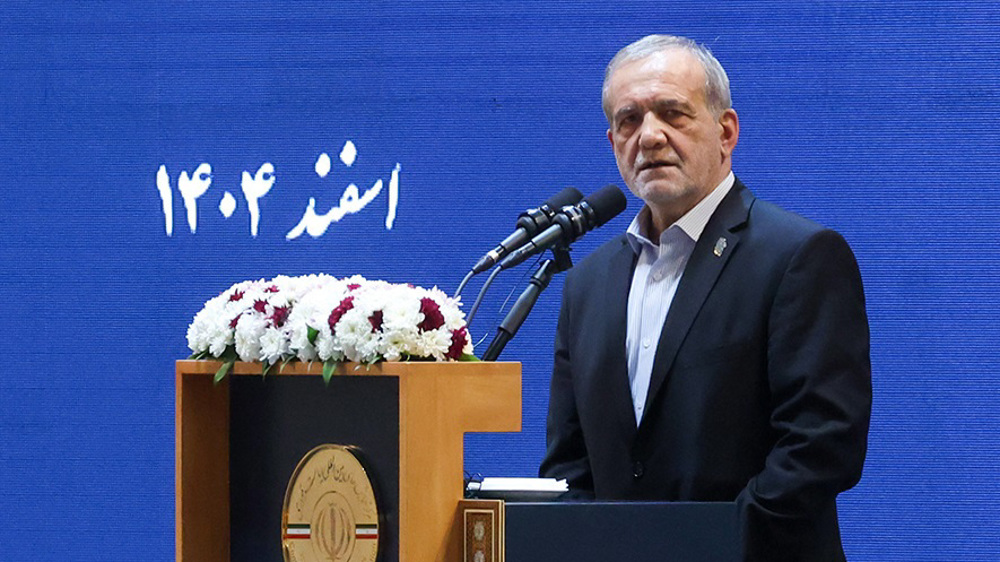
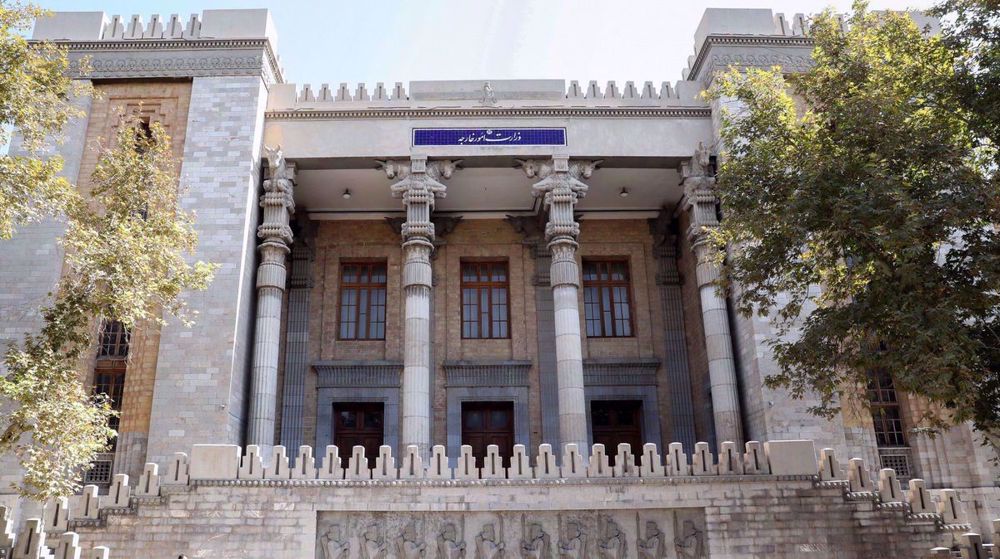
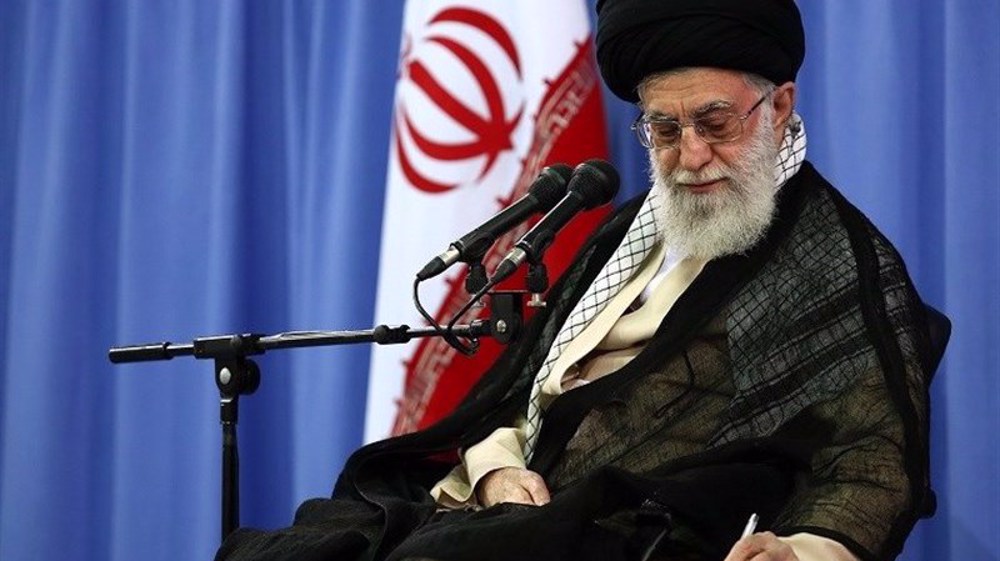



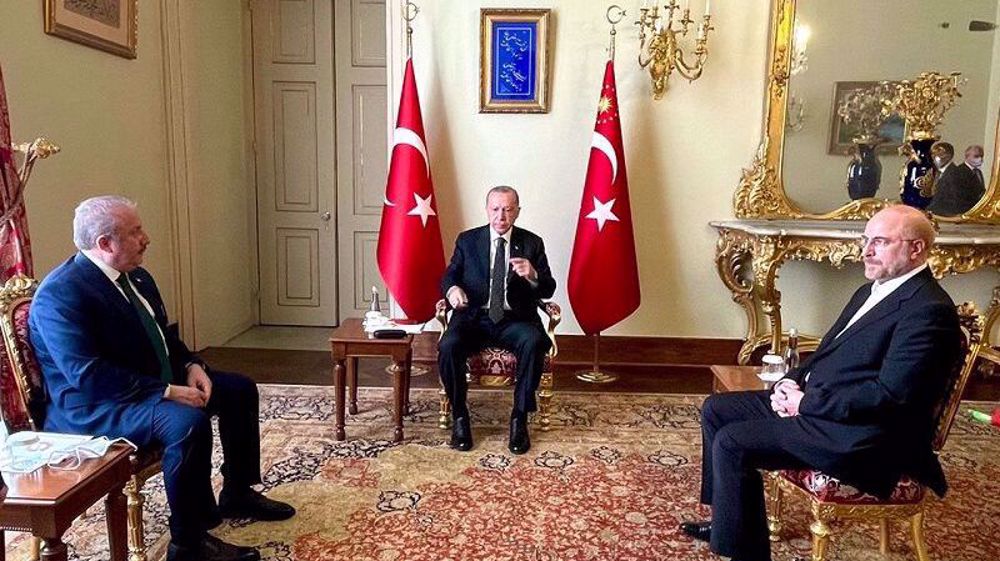
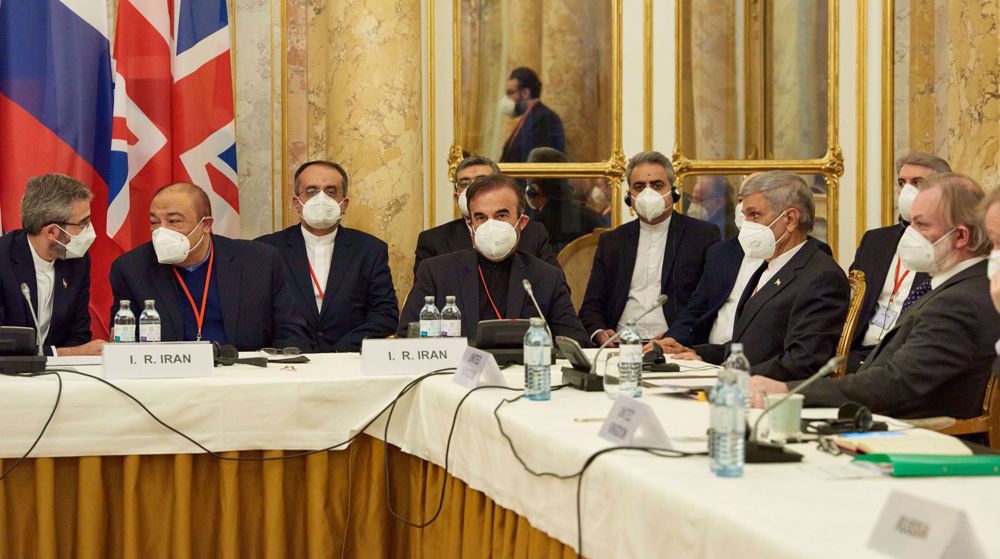
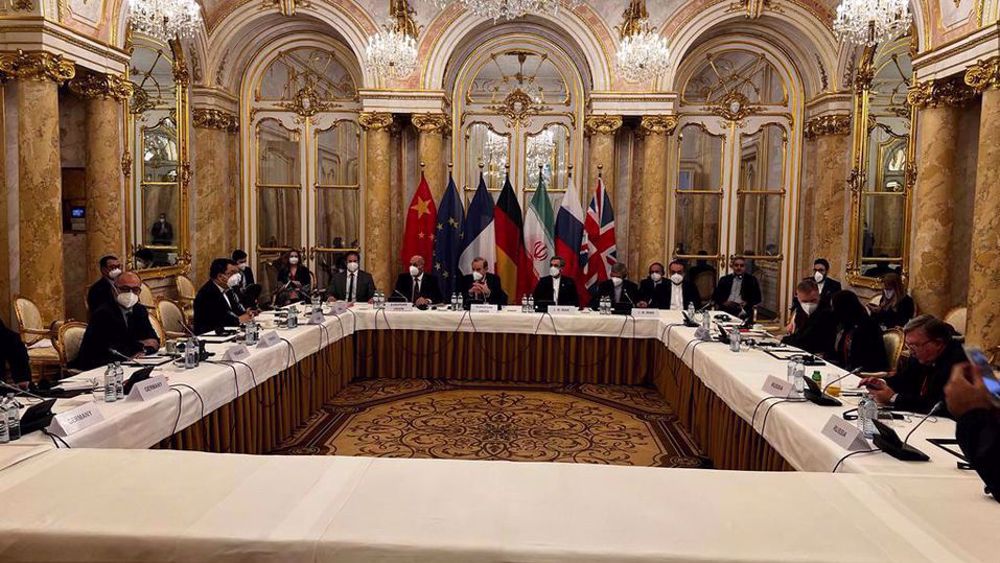
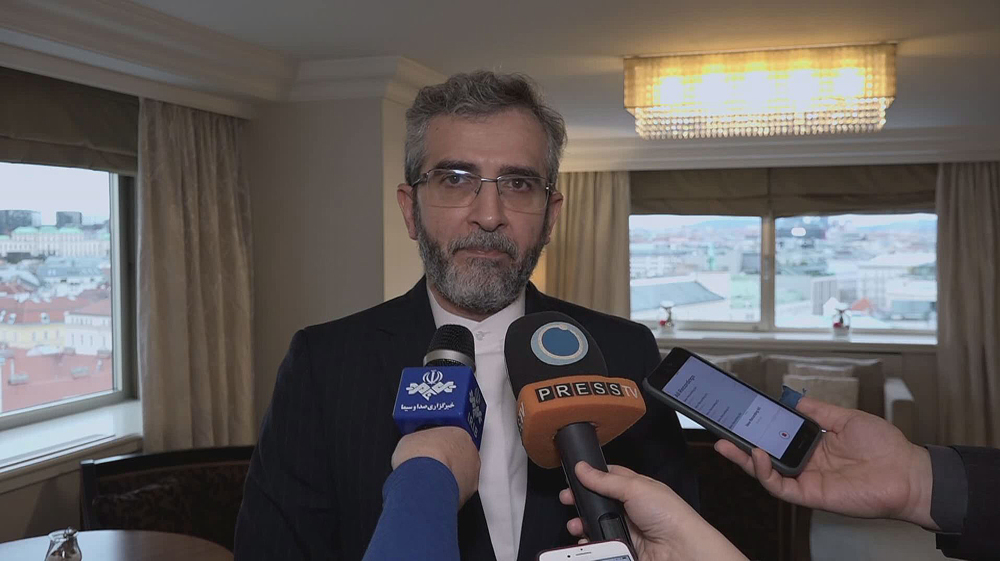

 This makes it easy to access the Press TV website
This makes it easy to access the Press TV website